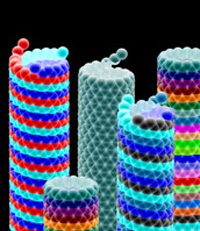
NSF
Carbon nanotubes growing atom by atom.
Scientists from across Missouri will meet Wednesday, Oct. 27, at Washington University in St. Louis to learn — in one jam-packed day — about the latest advances in nanotechnology and opportunities for commercializing them.
Organized by seven Missouri universities, the 2nd Annual Missouri NanoFrontiers Symposium is co-hosted by Washington University and the University of Missouri-St. Louis and begins at 7:45 a.m. in Whitaker Hall on the Danforth Campus. The meeting is free and open to the public.
WUSTL Chancellor Mark S. Wrighton, Robert Duncan, PhD, vice-chancellor of the University of Missouri-Columbia and Thomas F. George, PhD, chancellor of the University of Missouri-St. Louis will welcome participants to the symposium.
Their remarks will be followed by two keynote addresses.
The first, “Self-Powered Nanosensors for Medical Science, Environmental Monitoring and Personal Electronics,” will be delivered by Zhong Lin Wang, PhD, director of the Center for Nanostructure Characterization at the Georgia Institute of Technology.
Missouri Sen. Christopher S. “Kit” Bond will deliver the second address and discuss the role of nanotechnology ventures to Missouri’s economic development.
Technical sessions will address nanomedicine, technologies for sensing nanoparticles, nanostructures for energy applications and new nanomaterials.
At lunch, participants will have the opportunity to tour WUSTL’s Nano Research Facility (NRF) (see nano.wustl.edu for more information.). The university invested in the facility after it was invited to join the 14-member National Nanotechnology Infrastructure Network (NNIN), says Dong Qin, PhD, associate dean for research in the School of Engineering & Applied Science, and NNIN site director.
Qin characterizes the facility — open to scientists from other institutions and from private corporations — as “a machine shop” for nanotechnologists, which brings together the instruments and technical expertise needed to manipulate materials at the nanoscale (in billionths of a meter) and develop functional devices. The NRF will play an important role in a new nanotechnology minor for WUSTL undergraduates for which the National Science Foundation has just provided a start-up grant.
The final session, a panel moderated by Jingyue (Jimmy) Liu, PhD, director of the Center for Nanoscience at the University of Missouri-St. Louis, will address the role of the government and ways to engage the corporate community in commercializing nanotechnology.
Participants can register at surveymonkey.com/s/nanofrontiersregistration.